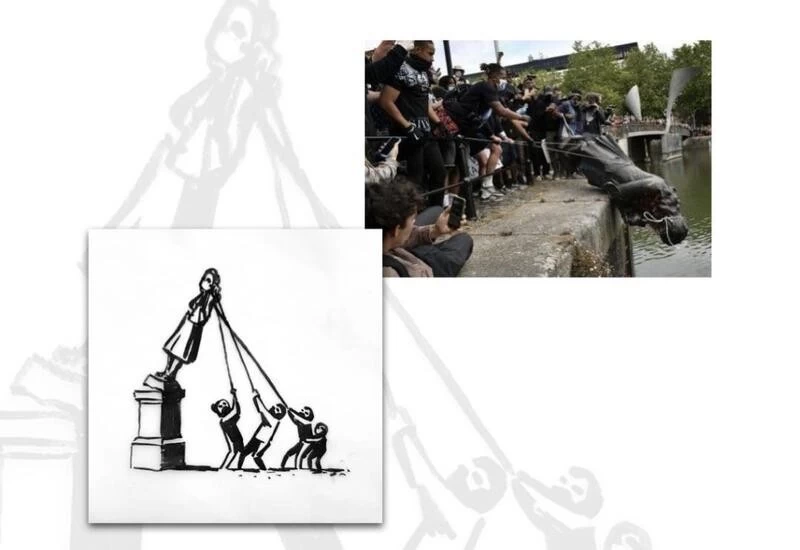Art Desk: Banksy has suggested the toppled statue of Edward Colston should be put back on its plinth in Bristol surrounded by sculptures of protesters pulling it down.
The graffiti artist unveiled a new piece of artwork inspired by activists who tore down a bronze statue of the 17th-century slave trader in an Instagram post today.
Alongside the image, which shows a statue close to toppling backwards as four people pull it with ropes, Banksy said the moment should be 'commemorated'.
In a caption, he wrote: 'What should we do with the empty plinth in the middle of Bristol? Here's an idea that caters for both those who miss the Colston statue and those who don't.
'We drag him out the water, put him back on the plinth, tie cable round his neck and commission some life size bronze statues of protestors in the act of pulling him down.
'Everyone happy. A famous day commemorated.'
The statue was toppled during an anti-racism demonstration in Banksy's home city of Bristol this weekend and was eventually rolled into the city's harbour.
Footage from the rally shows demonstrators heaving the metal monument down with ropes before cheering and dancing around it.
Boris Johnson condemned their actions as a 'criminal act', as Avon and Somerset Police confirmed a decision was made not to intervene.
In addition to Banksy's suggestion, a number of other famous figures have been put forward by Twitter users to replace the toppled statue. Suggestions have ranged from the serious to the hilarious.
One user put forward the idea of putting a statue of Football superstar Cristano Ronaldo who was famously depicted in Bronze at Maderia airport in the from of a much-mocked bust.
The statue, which only bore a slight resemblance to Ronaldo, has since been removed, but the Twitter user shared a photo-shopped image of the original bust placed on the plinth from which the Colston statue had been removed.
Sticking to the football theme, another user suggested a statue of Bristol City's Senegalese striker Famara Diedhiou should be placed there.
Another user shared a picture of the statue of Michael Jackson which was placed outside of Fulham FC's stadium in London by then-owner and Mohamed Al-Fayed. The statue was also removed, with the Twitter user writing: 'I wonder if Al-Fayed still has this knocking about?'
Another theme that stuck a chord with Twitter users was that of the Star Wars movie franchise.
One user retweeted a picture of a statue of the character Yoda that was first shared by Mark Hamill, who played Luke Skywalker, which had 'Matter Black Live do' written in graffiti underneath.
Another suggested a statue of Star Wars villain Darth Vader be placed on the plinth. While the character was famously voiced by American actor James Earl Jones, the man in the suit was Bristol actor David Prowse, who wore the suit but had his voice removed from the final cut of the film.
There were also more political suggestions, with one user suggesting a bust of ex-Labour Party Leader Jeremy Corbyn be placed there, while another suggested that a statue of ex-Prime Minister Margaret Thatcher take Colston's place.
Others have suggested the controversial torn-down statue should be replaced with a tribute to prominent civil rights campaigner Paul Stephenson, 83.
More than 18,000 people have signed a petition calling for a statue of Mr Stephenson to be installed on the now-empty plinth since the controversial Colston sculpture was removed this weekend.
Mr Stephenson led the Bristol Bus Boycott in 1963 after a company refused to employ black drivers and conductors. The 60-day protest eventually led to the company revoking its colour bar.
More than 18,000 people have signed a petition calling for a statue of Mr Stephenson to be installed on the now-empty plinth since the controversial Colston sculpture was removed this weekend.
Mr Stephenson led the Bristol Bus Boycott in 1963 after a company refused to employ black drivers and conductors. The 60-day protest eventually led to the company revoking its colour bar.
Another suggested replacement is that of Bristol pioneer Roy Hackett, a civil right's hero, co-founder of the Commonwealth Co-ordinate Committee (CCC) and founder of St Pauls Carnival.
A year later, the campaigner refused to leave a pub until he was served - activism which was pivotal in paving the way for the first Race Relations Act.
It has also been suggested the city should install a memorial to the thousands of West Africans who died aboard ships during Colston's time as Deputy Governor of the Royal African Company from 1680 to 1692.
The Company had complete control of Britain's slave trade, as well as its gold and Ivory business, with Africa and the forts on the coast of west Africa.


